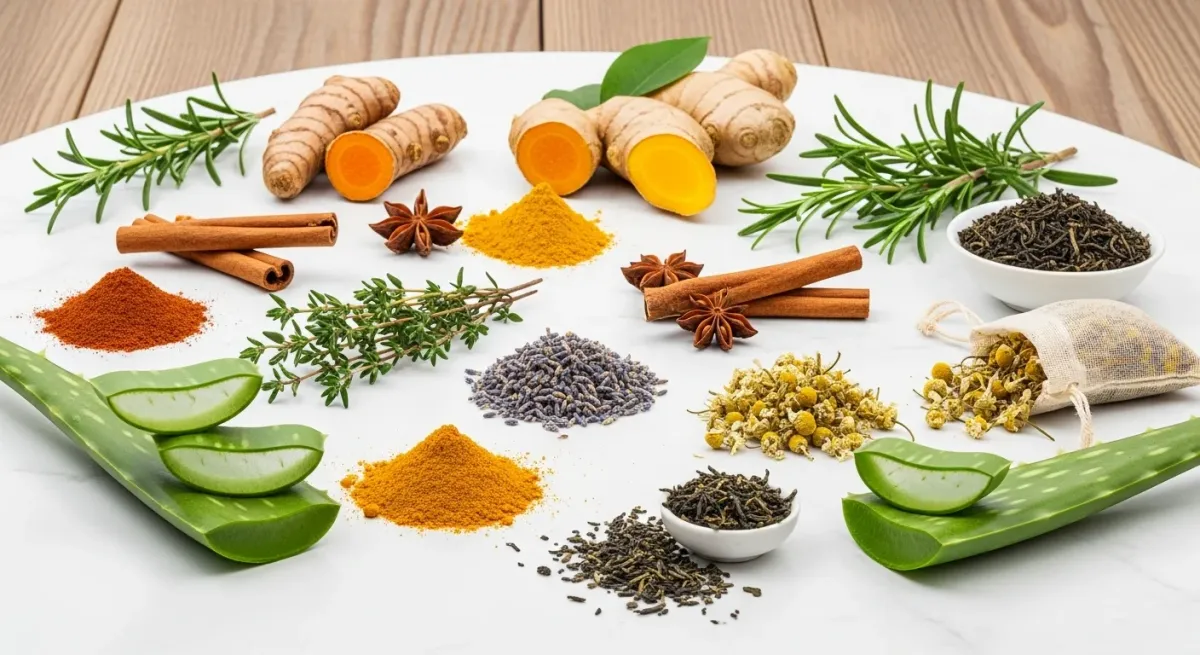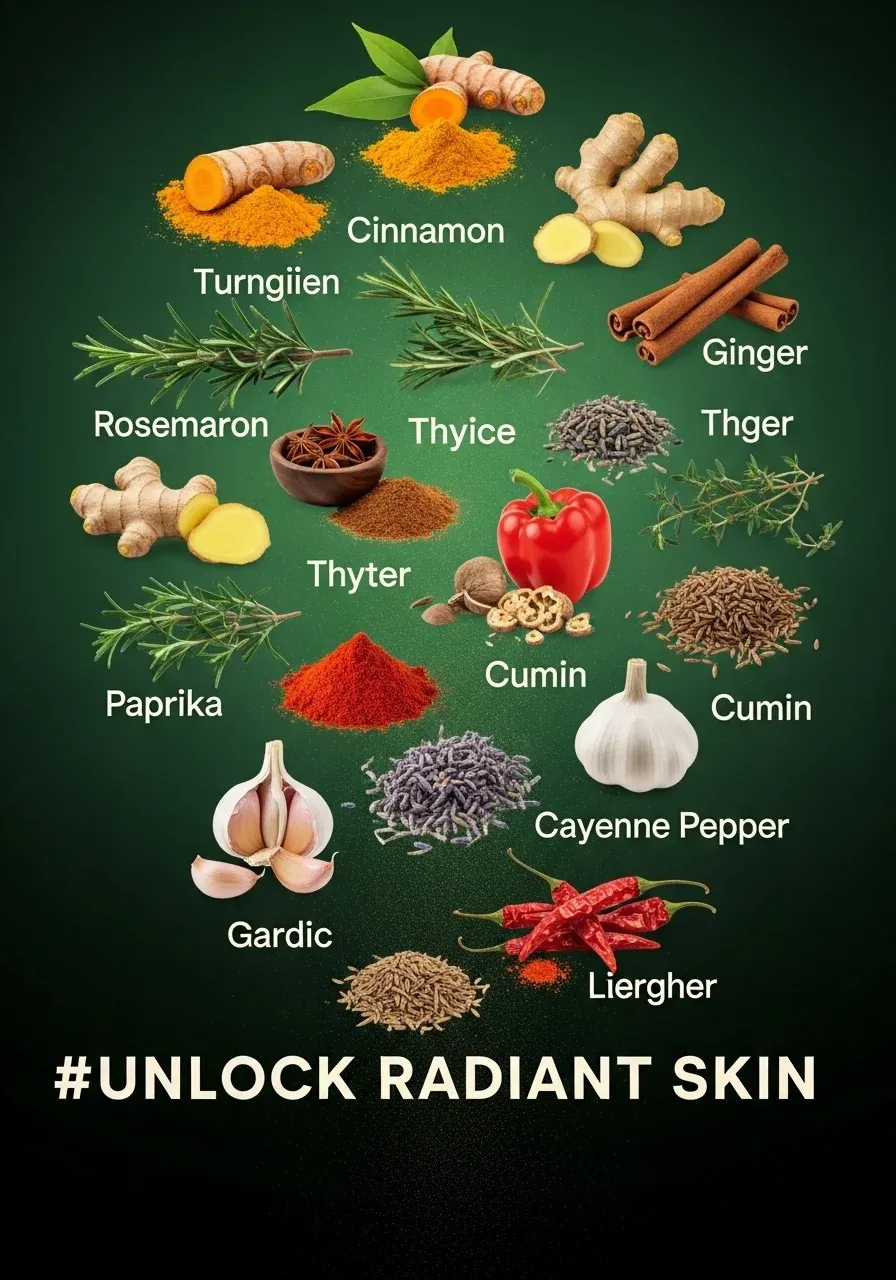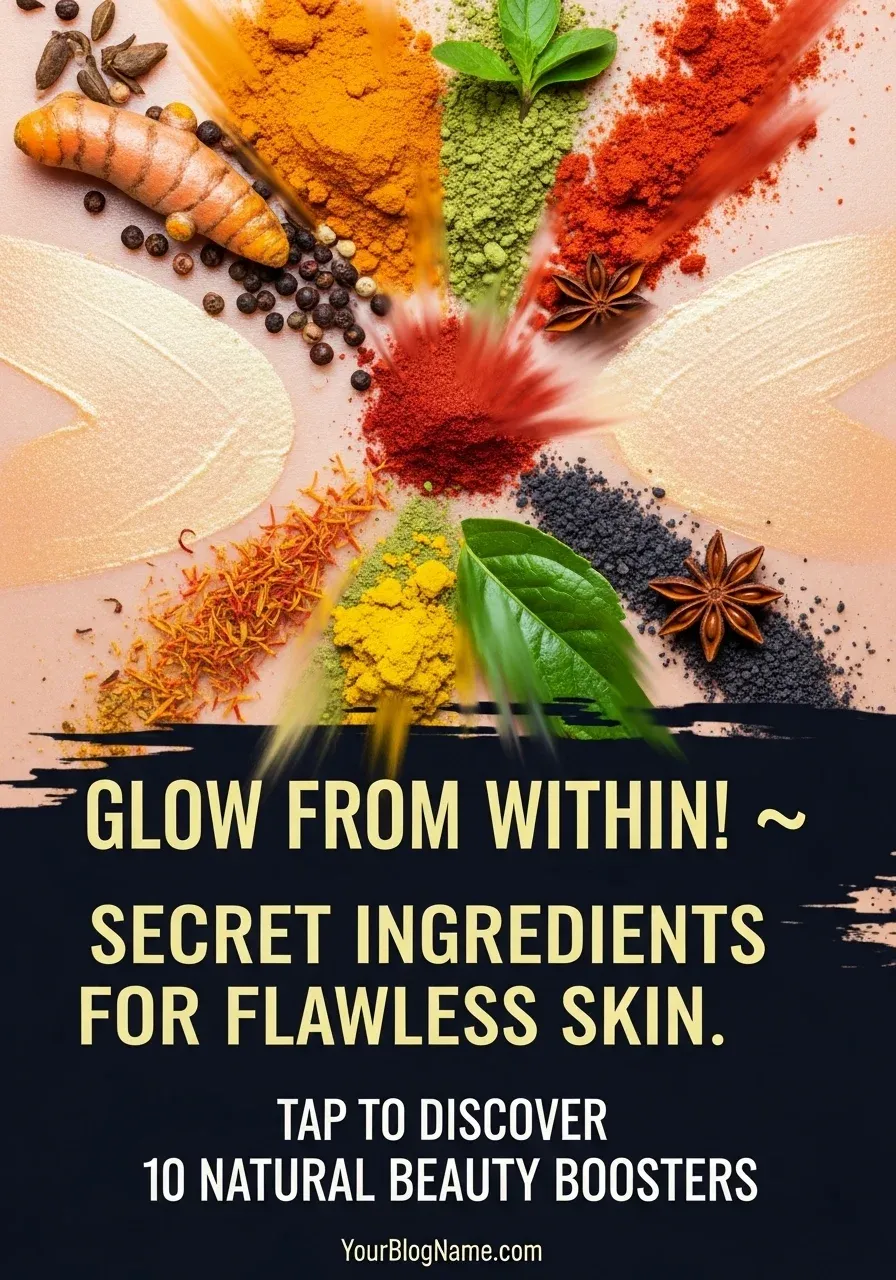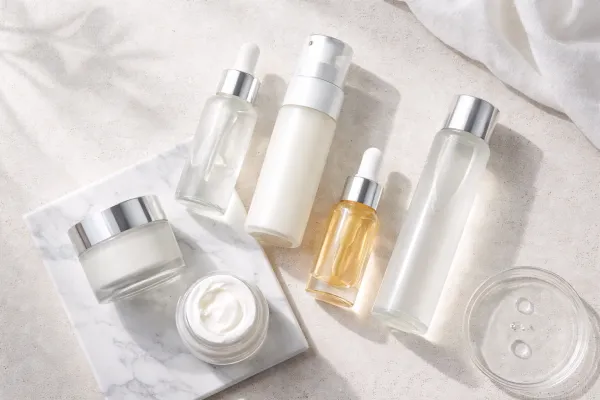10 Powerful Herbs & Spices for Radiant Skin: Unlock Natural Beauty
Unlock radiant skin with 10 powerful herbs & spices. Discover natural beauty remedies that nourish your complexion from within, fighting damage and boosting a healthy glow.

Your skin shows the world how you feel inside. Creams help, but true radiant skin comes from within.
You can feed your skin with powerful nutrients. This guide shows you how to use natural skin remedies from your kitchen for better skin health.
The Best Herbs and Spices for Skin Health in a Nutshell
- Fight damage: Antioxidants stop bad stuff from harming skin cells.
- Calm redness: Anti-inflammatory properties reduce puffiness and irritation.
- Build strong skin: Support collagen for firmness and elasticity.
- Boost glow: Improve circulation for a bright, healthy complexion.
- Clear up issues: Target concerns like acne and uneven tone.
Understanding Skin Health: Beyond Topical Treatments
Most people think about creams and serums for their skin. These help, of course. But real, lasting skin health starts deeper. Your body works like a complex machine. What you put into it matters greatly for your outside appearance.

Think of your skin as a window to your inner health. A dull window means a dull inside. Eating right is key for a glowing skin. It provides the building blocks your skin needs.
The Role of Diet and Nutrition
Your diet directly affects your skin. Certain skin-supporting foods provide vitamins and minerals. These help your skin heal and stay strong. Want to learn more about eating for a better look? Check out our guide on power foods for radiant skin.
Internal vs. External Skin Care
Topical products deal with surface issues. They can hydrate or protect. But they can't fix problems caused by what you eat.
Natural skin care means looking at both. It’s about feeding your body good nutrients and protecting your skin from the outside. Your overall skin wellness improves when you tackle both sides.
The Science Behind Herbs and Spices for Skin Wellness
Herbs and spices are more than just flavor. They are tiny powerhouses of good stuff for your body. Many have been used for centuries for their healing powers. Modern science now backs these old traditions. They offer real benefits for skin health.
These natural wonders work on a deep level. They help your body protect itself. They also help your skin fix itself. It's a smart way to boost your skin wellness.
Antioxidants: Your Skin's Best Defense
Antioxidants are like tiny shields. They protect your skin cells from damage. This damage comes from things like pollution and sun. Antioxidants help prevent early aging and keep your complexion fresh. They are crucial for anti-aging.
Anti-Inflammatory Powerhouses
Many skin issues start with inflammation. Think about redness or breakouts. Spices like turmeric are famous for being anti-inflammatory. They calm your skin from the inside. This leads to clear skin and a more even tone.
Collagen Support and Cellular Regeneration
Collagen keeps your skin firm and bouncy. As you age, your body makes less. Some herbs and spices help your body make more collagen. They also help your cells renew themselves faster.
This boosts elasticity and helps in cellular regeneration. For more about how your diet impacts skin, read about how diet affects teenage skin.
The 10 Powerful Herbs and Spices for Radiant Skin
You want radiant skin. These herbs and spices are a simple way to get it. They offer unique benefits, from fighting damage to boosting your glow. Think of them as small, mighty allies in your quest for healthy skin.

Adding these to your food is easy. You can also find them in teas or herbal supplements for skin.
Let’s look at the top players. These are your go-to beauty herbs.
| Herb/Spice | Key Benefit for Skin | How It Helps |
|---|---|---|
| Turmeric | Reduces inflammation, brightens skin. | Fights redness, evens out tone, packed with antioxidants. |
| Ginger | Boosts circulation, detoxifies. | Brings nutrients to skin, helps clear toxins, aids detoxification. |
| Cinnamon | Balances blood sugar, fights bacteria. | Reduces acne flare-ups, supports collagen production. |
| Rosemary | Strong antioxidant, protects from damage. | Prevents signs of anti-aging, improves elasticity. |
| Green Tea | Protects from sun, reduces redness. | Repairs damage, powerful antioxidants, calms irritation. |
| Aloe Vera | Soothes, heals, hydrates from within. | Reduces inflammation, speeds up healing, boosts hydration. |
| Holy Basil | Reduces stress, combats acne. | Lowers stress hormones that trigger breakouts, helps with clear skin. |
| Garlic | Fights germs, cleanses. | Powerful antimicrobial, helps with blemish control and infections. |
| Cayenne Pepper | Increases blood flow, nutrient delivery. | Brings oxygen and nutrients to skin cells for a healthy glow. |
| Parsley | Evens skin tone, vitamin-rich. | Reduces dark spots, provides essential vitamins K and C. |
Turmeric: The Golden Anti-Inflammatory
Turmeric is famous. Its active part, curcumin, is a strong anti-inflammatory. It can calm angry skin. It also acts as a powerful antioxidant. This helps fight damage from the environment.
Many studies back its benefits of turmeric for skin StyleCraze. Want to dive deeper? Read our full guide on turmeric for skin health.
Ginger: Circulation Booster and Detoxifier
Ginger warms you up. This warmth boosts your circulation. Better blood flow means more nutrients reach your skin. It also helps with detoxification. This removes waste that can dull your complexion. Ginger skin benefits include a brighter look.
Cinnamon: Blood Sugar Balance for Clear Skin
Cinnamon does more than taste good. It helps balance your blood sugar. Spikes in blood sugar can cause skin conditions like acne. By keeping it steady, cinnamon can lead to clear skin. It is also rich in antioxidants.
Rosemary: Antioxidant-Rich for Anti-Aging
Rosemary is a strong herb. It is full of antioxidants. These fight damage that causes wrinkles. It helps with anti-aging. Rosemary can also protect skin cells. It's great for overall skin wellness.
Green Tea: Catechins for Sun Protection and Repair
Green tea isn't just a drink. It contains catechins, powerful antioxidants. These can help protect your skin from sun damage. They also aid in skin repair.
For more, check out the power of green tea in skincare. It’s a true complexion booster.
Aloe Vera: Soothing and Healing Internally
You know Aloe Vera for sunburns. But drinking it can help your skin too. It's super soothing and helps heal. It boosts hydration from the inside. This makes your skin feel softer and look calmer.
Holy Basil (Tulsi): Stress Reduction and Acne Fighter
Holy Basil, or Tulsi, is an adaptogen. It helps your body handle stress. Stress often triggers acne and other skin conditions. By reducing stress, Holy Basil can help you get clear skin. It is truly an acne fighter.
Garlic: Potent Antimicrobial for Blemish Control
Garlic is a natural fighter. It has strong antimicrobial properties. This means it can fight bacteria and fungus. These are often behind breakouts. Eating garlic can help with blemish control.
Cayenne Pepper: Boosting Blood Flow and Nutrient Delivery
Cayenne Pepper makes you sweat. It also gets your blood moving. This increased circulation brings more oxygen to your skin. It also delivers more nutrients. This can give your skin a healthy, natural glow.
Parsley: Vitamin K and C for Even Tone
Parsley is more than a garnish. It’s packed with vitamins. Vitamin K helps reduce dark spots and circles. Vitamin C is a strong antioxidant and brightens skin. It helps create an even complexion.
Integrating Herbs & Spices into Your Daily Routine
Adding these beauty herbs to your life is simpler than you think. You don't need fancy routines. Small changes can make a big difference. The key is consistency. Make them a regular part of your day.
This is all about making choices that serve your skin wellness. You already eat daily. Why not make those meals work harder for your healthy skin?
Culinary Uses and Recipes
The easiest way is to cook with them.
- Add turmeric to curries or scrambled eggs.
- Put fresh ginger in stir-fries or smoothies.
- Sprinkle cinnamon on oatmeal or in your coffee.
- Use rosemary with roasted vegetables or chicken.
- Chop fresh parsley into salads or sauces.
These skin-supporting foods become part of your meals.
Herbal Teas and Infusions
Teas are a great way to get benefits.
- Drink green tea daily for antioxidants.
- Make ginger tea for better circulation.
- Steep Holy Basil leaves for stress relief.
- You can also try chamomile tea for calming properties.
These infusions offer herbal remedies in a soothing form.
Supplements and Dosages
If cooking is not your thing, supplements are an option. You can find herbal supplements for skin in capsules.
- Turmeric supplements are very popular.
- Green tea extract is another common choice.
Always check the label for dosage. Talk to a doctor before starting new supplements.
Synergistic Approaches to Maximizing Skin Benefits
Herbs and spices are powerful. But they work even better with other healthy habits. Think of it as a team effort. You want every part of your lifestyle supporting your goal. This is how you achieve truly radiant skin.
Don't just rely on one thing. Combine your efforts. This creates a strong base for long-term skin wellness. It is how to improve skin naturally from all angles.
Hydration and Lifestyle Factors
Water is vital. Proper hydration keeps your skin plump. It helps flush out toxins. Aim for plenty of water daily. Bad habits hurt your skin.
Eating foods to avoid for clear skin can undo all your good work.
Alcohol affects your skin, too, making it dry and dull. Avoid excessive sun exposure. Always wear sunscreen. Your choices outside the kitchen matter.
Addressing Specific Skin Concerns with Herbs
Herbs can target specific issues.
- For acne, focus on Holy Basil and Garlic. They calm inflammation and fight bacteria.
- For dullness, boost circulation with Ginger and Cayenne Pepper. This brings a natural glow.
- For anti-aging, use Rosemary and Green Tea. They are rich in antioxidants.
This approach customizes your natural skin remedies.
Precautions and Best Practices for Herbal Skin Care
While herbs are natural, they are still powerful. You need to treat them with respect. More is not always better. Always be smart about how you use them. Your skin health is important.
These guidelines help you stay safe. They ensure you get the most out of your spice benefits. Be careful and informed.
Consulting with Professionals
Always talk to your doctor. This is extra important if you have skin conditions. It's also vital if you take other medications. Some herbs can react with drugs. A professional can guide you. They help ensure safety and proper dosages.
Quality Sourcing and Organic Options
Where do your herbs come from? This matters a lot.
- Choose organic options when you can. This means fewer pesticides.
- Buy from trusted brands for herbal supplements for skin.
- Fresh herbs are often best for cooking.
Good quality means more active compounds. This gives you better skin health results.
From the Field: A Personal Note
After over a decade in this field, one thing became crystal clear to me. You can't out-cream a bad diet.
My first big mistake was pushing high-end topical products without asking clients what they ate. Their skin never truly changed. It was like trying to patch a leaky boat with a fancy sticker.
Then I started asking about breakfast. "What did you eat?" Many looked surprised. But when we talked about adding things like turmeric to eggs or ginger to a smoothie, things shifted. I saw clients' complexion go from tired to bright. Not overnight, but consistently.
I remember one client, a busy mom. She battled constant redness and dullness. She tried everything. I told her to add a sprinkle of cinnamon to her morning coffee, a little parsley to her lunch salad, and a daily cup of green tea.
Six weeks later, she walked in, no makeup, glowing skin. She said, "It's like my skin finally woke up." That's the power of these natural skin remedies from the inside out. It's about building health, not just hiding problems.
Conclusion & Next Steps
You now know the secret. Your kitchen holds powerful tools for radiant skin. These 10 herbs and spices are more than flavor.
They are tiny shields and healers for your skin health. Start small. Pick one or two to add to your daily routine.
Your skin will thank you. Ready to transform your complexion from the inside out? Start cooking with these beauty herbs today.
FAQ
Can I really get "clear skin" just by adding herbs to my diet?
Herbs and spices are powerful skin-supporting foods. They help reduce inflammation and deliver antioxidants. But they are not a magic bullet. For truly clear skin, combine them with a balanced diet, proper skincare, and a healthy lifestyle. Think of them as a major boost, not the only solution. The natural compounds in herbs like turmeric, green tea, and rosemary work synergistically with your body's natural processes to promote skin health, but they're part of a holistic approach rather than a standalone miracle cure.
How long does it take to see results from using herbs for skin health?
Just like any good habit, consistency is key. You might notice small changes in a few weeks. More significant improvements in skin wellness often take 1-3 months. Things like better circulation or reduced inflammation happen faster. Building collagen or seeing deep anti-aging effects takes more time. Your skin renews itself approximately every 28 days, so allow for at least one full cellular turnover cycle before expecting dramatic results. The cumulative effect of herbal nutrients working at the cellular level creates lasting beauty from within.
Are there any specific herbs I should avoid for certain skin conditions?
Yes, some herbs can interact with medications or worsen specific skin conditions. For example, some blood-thinning herbs might be risky if you're on blood thinners. If you have sensitive skin or existing conditions, always talk to a doctor or a qualified herbalist. They can offer personalized advice for your skin health journey. Photosensitive herbs like celery seed or certain citrus oils can increase sun sensitivity, while others like echinacea might trigger allergic reactions in sensitive individuals. Professional guidance ensures your natural beauty regimen remains both safe and effective.




